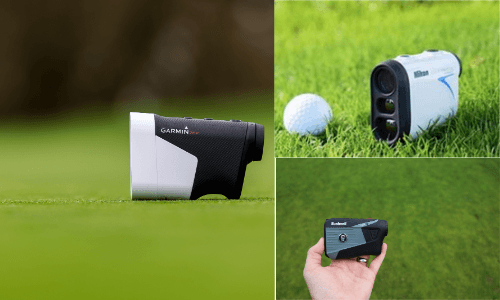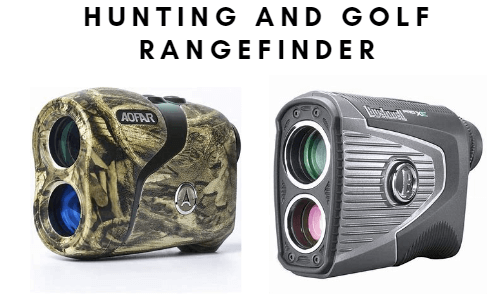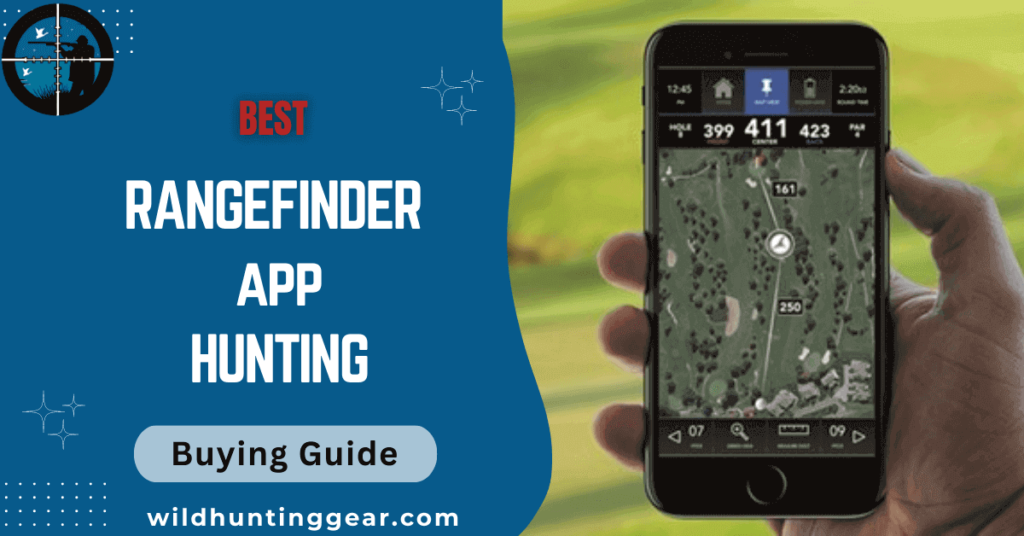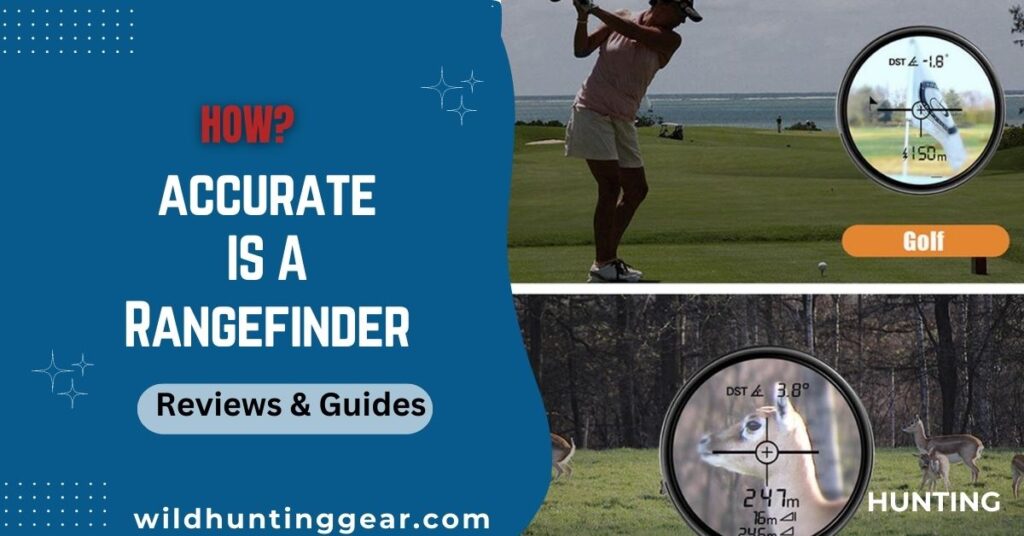Have you ever wondered if you can use a golf rangefinder for hunting? Golf rangefinders are devices That measure distances on the golf course but some people are curious if they can be used for hunting too.
In this article, we’ll take a look into whether it’s possible to use a golf rangefinder for hunting. We’ll also discuss the important features of using a golf rangefinder for hunting and examine the limitations of golf rangefinders when used in hunting scenarios.

Moreover, we will highlight the key considerations that hunters should keep in mind when using a golf rangefinder. By the end of this article, you have a comprehensive understanding of whether a golf rangefinder can serve as a hunting tool or not. So keep reading!

Can you use a golf rangefinder for hunting
The answer is yes, you can use a golf rangefinder for hunting. Golf rangefinders are not just for golfers, they can be very useful for hunters too. With a golf rangefinder, you can accurately measure the distance to your target and ensure your shot is right on the money.
Golf rangefinders use laser technology that can calculate the exact distances within one yard, giving hunters high precision when shooting their target.
Furthermore, the rangefinders are equipped with a variety of different features that make them even more useful for hunters such as angle compensation, slope adjustment and scan mode.
Comparison of similarities and differences between golf and hunting rangefinders.

Golf and hunting rangefinders serve similar purposes in terms of measuring distances but they are designed with different features and functionalities to cater to the specific needs of each activity.
Here’s a comparison of the similarities and differences between golf and hunting rangefinders:
Similarities:
1) Distance Measurement: Both golf and hunting rangefinders are used to measure distances accurately. They utilize laser technology or GPS systems to provide precise distance readings.
2) Portability: Rangefinders for golf and hunting are typically compact and lightweight, making them easy to carry around during the respective activities.
3) Optical Quality: Both types of rangefinders aim to provide clear and sharp optics for better visibility and accuracy.
Differences:
1) Targeting Modes: Hunting rangefinders often feature different targeting modes to accommodate the varying conditions encountered while hunting.
These modes may include a scan mode for tracking moving targets or a bow mode that compensates for angles and provides the true horizontal distance.
Golf rangefinders, on the other hand, are designed with features specific to golf, such as slope adjustment, flag-locking and hazard detection.
2) Range and Accuracy: Hunting rangefinders typically have longer maximum range capabilities compared to golf rangefinders. This is because hunters often need to measure distances to targets that are farther away.
Additionally, hunting rangefinders may prioritize accuracy over speed, as precise readings are crucial for determining bullet drop or arrow trajectory.
Golf rangefinders, on the other hand, may have shorter ranges but prioritize quick and accurate readings for golfers who need to make immediate club selection decisions.
3) Design and Aesthetics: Golf rangefinders often have a sleek and sporty design, resembling binoculars or monoculars. They are usually designed to blend in with golf equipment and attire. Hunting rangefinders, however, are often designed with camouflage patterns or earthy colors to blend in with the environment and remain inconspicuous while hunting.
4) Additional Features: Hunting rangefinders may include additional features such as angle compensation, ballistic calculations and target priority modes, which are specifically designed to aid hunters in making accurate shots.
Golf rangefinders, on the other hand, may include features like slope adjustment, pin-seeking modes and course mapping for assisting golfers in analyzing the course and making informed shots.
Advantages of using a golf rangefinder for hunting.
Advantages of Using a Golf Rangefinder for Hunting:
- Accurate Distance Measurement:
The laser technology and GPS systems used in golf rangefinders allow hunters to accurately measure distances to their target with precision. This can save time and energy spent on guessing the distance or having to use a larger device such as a binocular or scope.
- Versatility:
While golf rangefinders are primarily designed for golfing, their distance-measuring capabilities can be effectively utilized in hunting scenarios as well.
Hunters can take advantage of the rangefinder’s features and adapt them to their specific hunting needs, such as estimating bullet drop or determining the distance for bowhunting.
- Enhanced safety:
Knowing the precise distance to a target with a golf rangefinder can help hunters make safer decisions. It enables them to evaluate whether the shot is within their effective range, minimizing the risk of injuring animals or endangering others by taking ill-advised shots.
- Handy Size:
Golf rangefinders are typically quite compact and lightweight, making them easy to carry on long hunting trips or when navigating rugged terrain.
- Easy to Use:
Most golf rangefinders come with intuitive controls and simple menus, allowing hunters to easily get used to using the device.
- Adaptability to various hunting styles:
Whether you’re hunting from a blind, stalking or engaging in long-range shooting, a golf rangefinder can be a valuable tool. It allows hunters to adapt their approach based on the distance to the target and make adjustments accordingly, increasing their chances of a successful hunt.
Overall, incorporating a golf rangefinder into hunting gear can significantly enhance accuracy, convenience and safety, ultimately improving the hunting experience.
Limitations and drawbacks of using a golf rangefinder for hunting.
- Limited Magnification:
Most golf rangefinders only offer low-level magnification, which is not enough to clearly identify a target at long distances.
- Battery Dependency:
Rangefinders are powered by batteries and need to be regularly recharged or replaced in order to operate properly.
- Prone to weather conditions:
Rangefinders may be hampered by fog, rain and other adverse weather conditions that can interfere with their accuracy.
- Not designed for hunting:
While golf rangefinders can be useful in some hunting scenarios, they are primarily designed to measure distances on a golf course.
Therefore, they may lack features such as angle compensation or trajectory estimation that are required for successful hunting.
- Cost:
Rangefinders can be expensive and may not fit into everyone’s budget. Golf rangefinders can provide important benefits to hunters looking for accurate distance measurements and enhanced safety.
However, there are also some drawbacks that should be considered before investing in such a device.
Factors to consider for hunting with a golf rangefinder
When using a golf rangefinder for hunting purposes, there are several factors that hunters should consider to ensure its effectiveness and suitability for their needs. Here are some important considerations:
1) Range and Accuracy: The rangefinder’s maximum range and accuracy are crucial. Make sure the device can accurately measure distances within your hunting range. Consider the terrain you’ll be hunting in, as certain environments may require longer-ranging capabilities.
2) Targeting Modes: Look for a rangefinder that offers different targeting modes such as scan mode, brush mode or target priority mode. These modes help in identifying and isolating the target from surrounding obstacles like branches or grass, providing a clear line of sight for accurate ranging.
3) Magnification and Optics: The magnification level of the rangefinder determines how close you can see the target. Higher magnification is useful for long-range hunting but it may sacrifice field of view and stability. Opt for a balance that suits your hunting style and preferences. Additionally, ensure the optics are of good quality to provide clear and sharp images.
4) Durability and Weather Resistance: Hunting often involves rugged conditions, so choose a rangefinder that is built to withstand the elements. Look for features like waterproofing, shock resistance and sturdy construction to ensure the device can handle rough handling and adverse weather conditions.
5) Size and Weight: Consider the size and weight of the rangefinder, as you’ll likely be carrying it around during your hunting trips. A compact and lightweight device is more convenient and easier to handle in the field.
6) Battery Life: Check the battery life of the rangefinder, especially if you plan on longer hunting trips. You don’t want the device to run out of power when you need it the most. Consider whether it uses replaceable batteries or has a rechargeable option.
7) Cost: Set a budget and consider the rangefinders within that price range. While it’s essential to invest in a quality device, it’s also important to find one that meets your needs without breaking the bank.
Using a golf rangefinder for hunting purposes may have limitations compared to rangefinders specifically designed for hunting.
Alternative Options for Hunting Rangefinders.

If you’re looking for an alternative to hunting rangefinders, there are a few options available.
- Dedicated hunting rangefinders: These devices are specifically designed for hunters and feature features like angle compensation, ranging capabilities of up to 600 yards and other features.
- GPS Devices: A GPS unit can be used to determine the exact location of a game animal or target. This is particularly useful in cases where the terrain is too steep or difficult for traditional rangefinder methods.
- Smartphone Apps: There are a number of apps available for smartphones that allow you to measure ranges of game animals and targets. These apps tend to be less accurate than dedicated rangefinders but can still be useful in a pinch.
- Laser Rangefinders: A laser rangefinder is a device that uses lasers to measure distances up to 600 yards away. Laser rangefinders are more accurate than GPS units and smartphone apps but can be expensive.
No matter which option you choose, the key is to practice and become familiar with your chosen device before heading out on a hunt. Having the right equipment can make all the difference in having a successful hunting trip.
Conclusion:
In the end, it is clear that golf rangefinders can be used for hunting. Being able to accurately measure distances can be key when planning a hunting strategy and help you make accurate shots.
While there may be some limitations compared to traditional hunting gear. It’s worth considering if you’re looking for a multifunctional tool that offers flexibility in both outdoor sports.
No matter which route you choose, it’s important to practice with your chosen device beforehand to get the most out of it.




